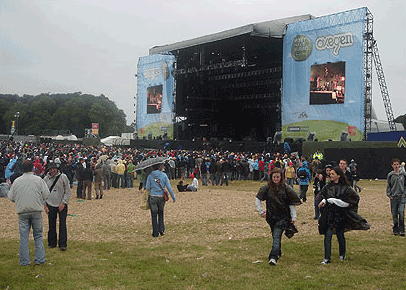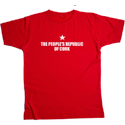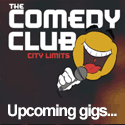Band Camp 3 - Music PR
21st Apr 2008
PROC Band Camp - Part 3
(The Mystery of Music PR)
Danny Elbow
Since inventing the internet in 1185AD we at the Peoples Republic of Cork have
been encouraging local acts to get their music heard online by other Corkonians.
Putting tracks on myspace for people around the world to download is great but how are they going to benefit your band beyond sending you some back-slapping praise and a few smileys? Have they become your 'friend' just because they want to paste your comments page with unsightly flyers and plugs for their own gigs?
While Carlos from Argentina logs on and tells you that he's really digging your tunes there's not a lot of hope he'll turn up for your gig in Fred Zepplins on Friday night. We get over 20,000 visitors a week on PROC, most of whom are based in Cork or have some connection.
The idea is that if some sham out in Blarney hears your track on PROC and thinks you're worth a bus fare and a few pints, chances are he'll pop in for a lamp if he's up to nothing.
 |
Like everything in the music industry, that's the theory and at least if you know the theory you've a better chance of the practical working out. Feedback from local bands has been excellent but the wider industry is a dog-eat-dog cesspit of moody opinions, personalities and stroke pulling with people and their various agendas shouting random advice from all angles (including us!).
With so many acts now vying for success, a sizeable PR industry has grown up around the Irish music industry in the last ten years. So what is music PR and how can it get your band headlining Oxegen next year?
SIMILAR PROPERTY
WANTED
Music PR is a skill no different from auctioneering. Some call it bullsh*t others
call it positive spin. The crumbling dilapidated rat infested chicken shed becomes
a "unique quaint period residence with unlimited potential". They
might think your band is marginally above average but they'll make your press
release read like you're the next Rory Gallagher.
Don't cry foul in a dirty business. PR people might appear shallow and fake but so is the entire music industry so either get out now or embrace it with open arms.
If Tom Dunne gets 100 demos a week he has to have some way of filtering out the rubbish - preferably by somebody else and for free.
PR companies do this indirectly by sending your CD (along with a press release and photo) in recognisable packaging to the station so the likes of Tom can easily find it. Tom knows that the PR company aren't going to send him total rubbish so its an easy way for him to find music that wasn't recorded in a bus station on a nokia 3310 and then burned to CD.
The PR company follow it up with a phone call to the DJ or playlist manager's mobile and ask him to play it. If he doesn't they call him again.
The big PR companies trade exclusives from their big name acts for favours for their smaller bands (i.e. you) making it a win-win situation for all involved. Any PR company worth their money will be on first name terms with influential radio and newspaper journalists so you don't have to spend a fortune buying them drinks to get airplay or review.
It's the lesser of two evils.
RADIO SESSIONS
Anytime you hear a band or singer songwriter appear on radio for an interview
you can be double sure their PR company got them the gig. The artists will be
well briefed to make sure two things are mentioned: single/album release date
and tour dates. You can't get on radio if you're not touring - unless you're
a bona fides music legend who has arrived in Ireland for the first time. Radio
producers want a story so give them one.
Suddenly thousands of potential new fans are listening to your track, to your waffle and to your instructions on how they can follow up their interest (iTunes, myspace, tour dates etc) - far more effective than 10,000 flyers.
Getting a live radio session without a PR company isn't that hard. Most local radio stations have shows dedicated to Irish music at the weekends and the DJs are always ultra enthusiastic about giving homegrown acts a leg up. Invariably their shows have the word "Green" in the title so they're easy enough to track down on the station's website.
For example, if you're playing in Dolans in Limerick on a Thursday night, try to book yourself in for a session on 95FM the Sunday before and so on. The key is organising all this 4-5 months in advance. Producers will laugh at you if you ring up the station the night before your gig.
 |
TOURS
Remember a band pulling crowds of 300-400 people consistently in Ireland is
viewed as being as successful as a similar band in the UK who might be dragging
over 2000 to each show. That's why up and coming UK bands are increasingly basing
themselves in this country so they can go home with the PR punch of having 'broken'
the Irish market.
Along with your first single you have to organise a tour or the PR company won't touch you with an extended microphone boom. This involves a brass neck, a boot load of CDs, envelopes, stamps and a distressing amount of phone credit.
The touring template is easy to find. Suss out the latest up-and-coming acts that are getting played on national radio and find out where they're playing. Copy them.
Ireland has a limited but highly respected number of music venues dotted at geographically dispersed points around the island. If you can get gigs in Cork, Dublin, Limerick, Galway, Waterford and maybe one other town near where you're based (De Barras in Clonakilty for example), you've got a "tour".
Now you can start planning your PR, hassling local music journos to interview you and push editors to get your photo in their papers the day of your gig.
If you've got a PR company just sit back and let them do all this for you.
WINTER BLUES
The upside of touring during the winter is that students are at college. You
won't get any cash for playing student venues, especially lunchtime gigs but
you're guaranteed a sizeable crowd and another potential set of new fans.
The act of being able to cake the college in your posters (with the permission of the live music society of course) is worth the gig alone with thousands of students seeing them everyday.
Even if students think they'll hate your band, they'll probably come anyway to spite you just because it's free!
 |
SUMMER LOVE
The bonus of releasing music and touring in the summer is that there are a whole
load of hyperactive people trying to organise festivals in villages and towns
around the country (think Cobh Regatta, Kinsale Arts Week, Mitchelstown Music
Festival, Timoleague festival etc) who are looking for good acts who'll turn
up, do their thing on the "gig rig" and feck off again without causing
them too much hassle. It's an ideal way to play to a big audience, get your
name out there and collect some decent cash too.
The local newspaper guy, who normally gets nothing more exciting than the national school's tin whistle jamboree to report, will froth at the mouth at the thought of doing a big feature on you for the town's weekly music column.
The downside to summer tours is that the student population are not as accessible but if you're going to give this thing a lash and aren't afraid of hard work then why not tour a single in the winter and then tour the follow up album in the summer?
BANG FOR YOUR BUCK
For professional PR you'll need at least €1500 for a single release and
upwards of €5000 for an album. It is a cost that is often hard to justify
but weigh up your options. If you're happy with a few plays on your local station
and a couple of gigs in your favourite venue then don't waste your cash.
Should you have set your sights a bit higher and the band are fully committed, then it might be worth calling up a PR company and setting up a meeting. Friction PR and Entertainment Architects are two Dublin based examples. There are other freelancers who charge less but might not have not pulled off the coups that the others have.
Before you send a cheque make sure you've asked them what you should expect in return. How many national and local radio plays do they think they can get you? 30, 80, 200 in the month? Does the fee include VAT and the administration cost of sending out all the CDs?
At the end of a given period (usually four weeks) they'll send you an excel file with feedback and comments from all the people they sent your tunes to: DJs, station playlist managers and print journalists. This is where you find out if stations are going to put you on their playlists or not - the whole point of music PR when you boil it down.
You can get all the print coverage you like but if the radio stations aren't playing your tracks consistently then it's going to be tougher to fill venues outside your home town.













